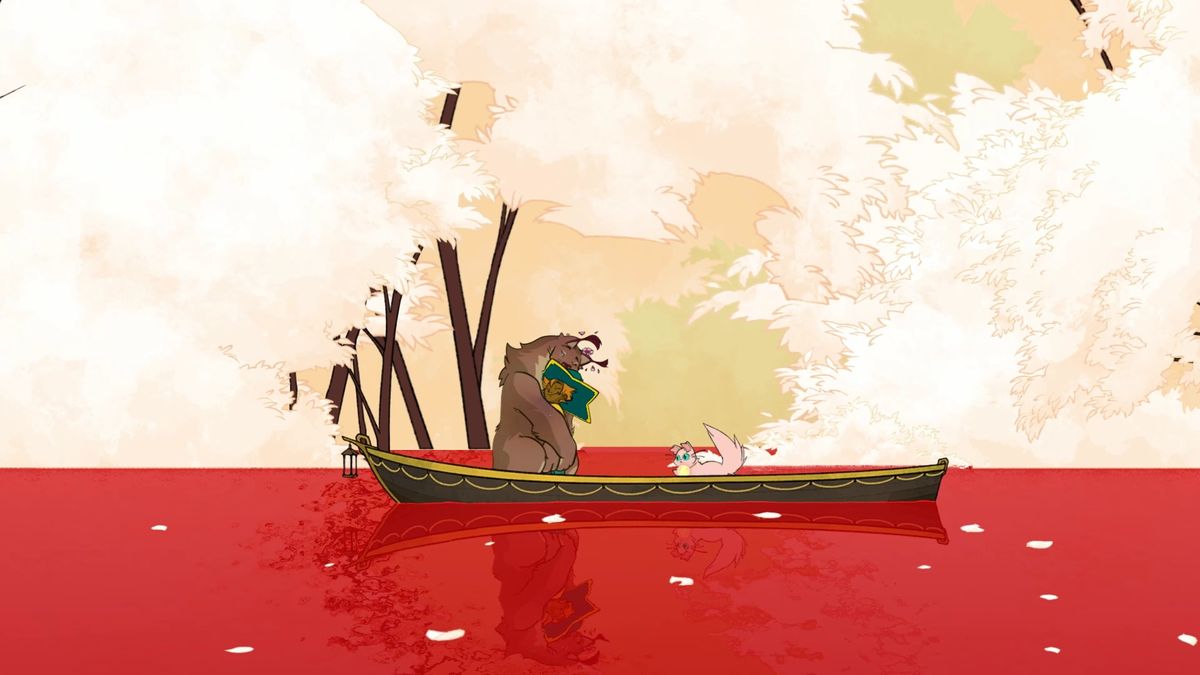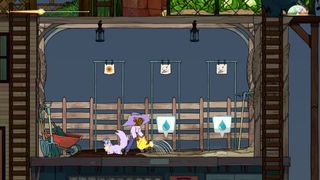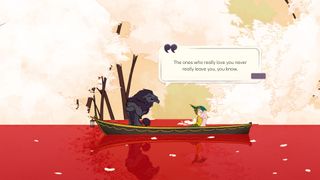Spiritfarer offers a rewarding, heartfelt experience about moving on and learning to let go
Thunder Lotus' management game about dying takes you on a journey filled with so much heart and depth

At the beginning of my journey as Stella in Spiritfarer, I awake on crimson shores to find myself on a small rowboat with my cat Daffodil. A mysterious hooded figure is pulling me along, and with a booming voice, they introduce themselves as Charon, a Spiritfarer. Or, at least, they were a Spirifarer. Now though, it's their time to go, and Stella and Daffodil will take over and "share the burden" of the role.
As a Spiritfarer, you act as a caregiver, comforter, and confidant to stray spirits who are caught up in this mystical world made up of various islands. It's your job to fulfil their last requests, and in doing so, ready these dying souls to pass on by taking them to the Everdoor, which acts as a sort of portal to the afterlife. After spending time with the spirits, I already know that saying goodbye and letting them go isn't going to be easy, but it isn't until I reach the end of my journey that I truly grasp the weight of the burden put upon me.
Letting go

Charon's words begin to have a deeper and deeper meaning the further I progress. The now all too familiar lump in my throat starts to form and tears threaten to spill from my eyes. The time has come again. Another spirit is ready to leave. To be let go. Astrid the lion spirit wants to depart.
The trouble is, I'm already so attached to her, and even after saying goodbye to many other spirits by this stage, I still find it hard to reconcile with the idea that she'll be gone. Astrid's been on my boat for quite some time, and I'm accustomed to her presence on my ship. The thought of her finally passing on makes my heart sink. I know it's for the best, but it still hurts. Going to the Everdoor isn't getting any easier.
The way I feel so strongly about Astrid and every other spirit I meet is a testament to how effectively Spiritfarer portrays its characters. With so much attention to detail, every spirit has their own distinct personality, and as a result, it's all too easy to develop a fondness for them. From the way the gluttonous frog spirit Atul bounces his hands on his belly in glee, to the playful step of Stanley the kid mushroom, and the endearing sweet elderly hedgehog Alice, everyone has their own particular mannerisms, expressions, tastes, and flaws, which makes them really feel like fleshed-out people I could easily encounter in real life.

As I take each spirit to the Everdoor, I cry without fail every time, but I also can't help but feel like I'm taking part in something special. I'm witnessing their final moments, the point at which they come to terms with their own life and their end, and it's so rewarding to help them get to where they need to be.
While the spirits sometimes talk about uncomfortable truths that we can all relate to when faced with the idea of our own mortality, hearing them talk about their readiness to leave helps me come to terms with letting them go, too. After Stella and Astrid share one final warm embrace, the lion spirit shoots up into the sky to join the other spirits I've released so far, becoming a constellation of stars that reflects the shape of her spirit form.
Sign up to the GamesRadar+ Newsletter
Weekly digests, tales from the communities you love, and more
At night, the constellations remain, decorating the sea of stars above. I take comfort in thinking they're watching over me as I continue my journey with Stella. That they're still with me, even if they're not there physically anymore. The message that the people we met and knew in life stay with us long after they're gone is at the heart of Spiritfarer. The spirits help you progress just as you help them, and traces of the characters you meet remain all around you as you move forward.
Finding balance

The emotional weight of letting go of spirits is balanced out with the smaller tasks that shape a large part of the experience of Spiritfarer. As it is a management game, you spend a lot of time collecting resources, caring for the spirits, and maintaining the many different amenities on your ship as you travel to different locations on the map. With a day and night cycle set up, the ship comes to a stop when night falls, and you can either sleep until morning, or perform various little tasks such as fishing, tending to plants, looking after livestock, and crafting, as you wait for the sun to rise.
I find myself easily slipping into a routine as I set the boat to travel to a location, and there's something so comforting about returning to the familiar rhythm of performing smaller tasks after letting go of yet another spirit. Because while I miss the presence of my newfound spirit friend, and their absence leaves its mark on my heart, I can keep going forward. I can move on.
Each spirit teaches you how to gather a particular resource through a character-specific event you can take part in on your ship. Just as each spirit is different, each event is a spectacle to behold in its own distinctive way - from jumping to gather mystical jellyfish to catching lightning in a bottle, and collecting comets that shower down in a spark of rainbows, every activity is accompanied by a different music track that really elevates the experience.

Whether it be through helping you gather a particular resource, or by the physical space they leave behind on your ship, the spirit's presence never really goes away. The rooms, which also reflect their personalities, almost become monuments to the characters who shared part of the journey with you. Once a spirit goes to the Everdoor, they leave behind a spirit flower that helps you upgrade your boat. The flower, along with an Obol coin you can use at shrines to unlock new moves for Stella, are constant reminders of both the journey you've been through so far, and the spirits who help you get to where you are now.
Both the ship upgrades and Stella's abilities form up Spiritfarer's progression system. Certain sections of the map, for example, will be closed off to you with different elements such as ice blockades, and upgrading the boat helps you navigate through these obstacles. The pleasing sense of progression you get as you unlock a new upgrade or see your boat grow ever-higher as you add to it makes everything you do feel fulfilling.
Love and laughter

For all of its heavier, bittersweet moments, Spiritfarer is also full of lighthearted humour that really helps take the edge off. I'm continually pleasantly surprised by all of the little quips and lines of dialogue I encounter as I speak to spirits who dwell on islands. From telling me off for bouncing on their parasol umbrella, to declaring that I'm a murderer for cutting down a tree, I find myself laughing out loud frequently and it's hard not to be utterly charmed by every facet of this fictional world.
It's not easy to create something that can make you laugh as much as it makes you cry, much less when it comes to a game that explores coming to terms with the end of life, but the team at Thunder Lotus succeed at making so many feelings swirl around my heart throughout, and it's as comforting as it is moving.
While some of its farming, crafting, and resource collecting mechanics feel familiar, Spiritfarer has so much richness and depth, and everything you do feels meaningful and rewarding. Even in-between moments when I'm not playing the game, I catch myself thinking about it and picking apart all of the little details that really make it shine. Gorgeously animated and beautifully brought to life with an enchanting soundtrack, soaking up the sights and sounds of this mystical world is a true joy, and spending my time with the loveable spirits is an experience I won't soon forget.
Spiritfarer is officially out now on Xbox One (and Game Pass), PS4, Nintendo Switch, and PC (via Steam, Epic, and GOG).

I started out writing for the games section of a student-run website as an undergrad, and continued to write about games in my free time during retail and temp jobs for a number of years. Eventually, I earned an MA in magazine journalism at Cardiff University, and soon after got my first official role in the industry as a content editor for Stuff magazine. After writing about all things tech and games-related, I then did a brief stint as a freelancer before I landed my role as a staff writer here at GamesRadar+. Now I get to write features, previews, and reviews, and when I'm not doing that, you can usually find me lost in any one of the Dragon Age or Mass Effect games, tucking into another delightful indie, or drinking far too much tea for my own good.
Most Popular






